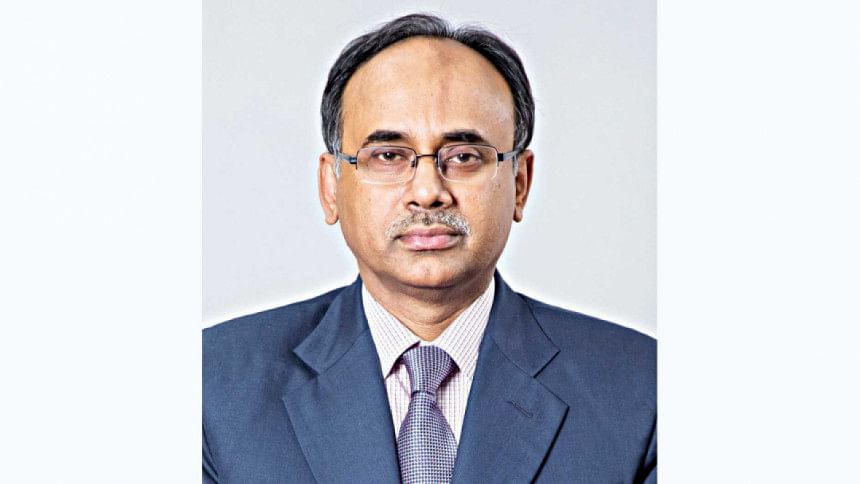Pressure on external sector, inflation to ease after polls

The pressure on the external sector and inflation will start to peter out from the third quarter of the current fiscal year, particularly after the parliamentary elections, said the Bangladesh Bank governor yesterday.
"There is nothing to worry about. We have already reached the bottom and we can see the light at the end of the tunnel," said Abdur Rouf Talukder.
"We will bounce back by June."
He made the comments during a meeting with a delegation of the Economic Reporters' Forum (ERF) at his office in the capital.
Finance Secretary Md Khairuzzaman Mozumder, Financial Institution Division Secretary Sheikh Mohammad Salim Ullah, deputy governors and senior officials of the central bank were present.
According to the governor, the central bank will not make any investment from the foreign exchange reserve. "Rather, it looks to increase the level of forex reserves over time."
In March 2021, the government approved to use 524.56 million euros from the reserves for a development project for the dredging of a channel for Payra Port, a seaport in Patuakhali.
The BB forecasts that the reserves will increase to $24 billion in June as per the balance of payment manual of the International Monetary Fund (IMF).
Talukder said the BB has imposed limits on loan rescheduling to four to curb loan defaults. "Thanks to the limits, the loan rescheduling has gone down."

The governor shared the observation as he expects that the flow of foreign direct investment and the release of foreign loans by multilateral lenders will increase after the general election, scheduled to take place in January.
Besides, as the Federal Reserve, the central bank of the United States, has kept its benchmark interest rate unchanged, the flow of short-term foreign credit and trade credits is expected to recover from March, leading to an improvement in the financial account, he said.
The financial account, a key component of a country's balance of payments, had been in the positive territory until 2021-22 as the inflow of funds through foreign investment, medium and long-term loans, trade credit, net aid flows, and portfolio investment was better.
The account fell into deficit in 2022-23 and the negative balance continued in the current fiscal year, central bank data showed.
In July-September of 2023-24, the financial account stood at $3.92 billion in the negative whereas it was $839 million in the positive in the same period of FY23.
However, the current account turned surplus thanks to the central bank's moves aimed at discouraging non-essential imports and price monitoring by banks to bring down import bills and contain illegal trade-based money laundering through over-invoicing.
Talukder said the central bank had wanted to contain imports and reduced the current account deficit in order to arrest the volatility in the exchange rate.
The central bank was able to contain imports and improve the current account situation through policy measures.
"However, we did not expect a deficit in the financial account," he said, adding that the financial account had been in the positive territory for nearly one and a half decades before turning negative.
"This has created a problem," he said, expressing his hopes for a rebound from the third quarter.
The governor shared the optimism at a time when the taka is under severe pressure and the country's foreign exchange reserve is falling as the inflows of international currencies continue to remain below the requirement to clear bills for imports and meet other international payment obligations.
The major factors behind the country's current woes such as the Russia-Ukraine war, the global energy shortage, higher commodity prices, the lingering impacts of the coronavirus pandemic as well as the absence of adequate policy measures on the part of Bangladesh are still there.
Sustained high inflation has also created challenges for the BB.
After a month of easing, inflation soared to 9.93 percent in October from 9.62 percent the previous month, according to figures released yesterday by the Bangladesh Bureau of Statistics.
The BB chief said it has taken the contractionary monetary policy and hiked benchmark interest rates half a dozen times in order to reduce excess demand in the economy.
At the same time, the central bank has lifted the interest rate ceiling in an effort to reflect the market reality. The BB has also decided not to lend to the government to contain inflation.
The central bank is trying to increase the supply of goods in the market by giving importance to credit flows to cottage, micro, small and medium enterprises and the farm sector.
On the fiscal side, the government has taken measures for fiscal tightening.
The government has decided to stop borrowing from the central bank to contain prices and stopped land acquisition for public projects and purchase vehicles, among other measures, said Finance Secretary Md Khairuzzaman Mozumder.
"Our target is to bring down the point-to-point inflation to 8 percent."
The central bank has targeted to limit the average inflation to 6.5 percent by June.
Talukder, however, said non-economic factors such as syndication by market players and seasonality are also responsible for the elevated level of inflation.
He said the central bank will also let the market forces determine the exchange rate of the taka with the US dollar and other foreign currencies fully.
"We have already asked banks to go for the market-based exchange rate."
Talukder said except for volatility in the external account and inflation, the fundamentals of the economy such as agricultural output, have been good and a 6 percent growth projection by the IMF is a testimony to the performance of the economy.
"We do not have food shortage."
In a paper presented at the event, Md Habibur Rahman, chief economist of the central bank, said the exchange rate volatility, high inflation and high ratio of non-performing loans are the major challenges for the economy.

 For all latest news, follow The Daily Star's Google News channel.
For all latest news, follow The Daily Star's Google News channel. 



Comments